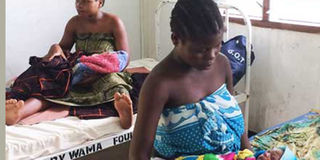Our delivering mothers deserves better service

What you need to know:
We are happy to note that campaigns that urge expectant Tanzanian women to attend clinics so that their condition and that of their unborn babies are monitored are important have been very fruitful. Maternal mortality rate (MMR) that stood at 460 in 2010 had dropped to 398 as of last yea
As the world looks forward to marking the International Women’s Day tomorrow, it is apt for us to look at the state of Tanzania’s delivering mothers who have to contend with difficulties, even while in the hands of medical personnel.
We are happy to note that campaigns that urge expectant Tanzanian women to attend clinics so that their condition and that of their unborn babies are monitored are important have been very fruitful. Maternal mortality rate (MMR) that stood at 460 in 2010 had dropped to 398 as of last year.
Now, despite the progress we are making, there are disturbing reports of medical personnel who are notorious for treating our mothers so shoddily that some would be forgiven if they chose to give birth to their subsequent babies at home.
In virtually all public hospitals in Dar es Salaam City, women in the maternity wings speak of poor treatment in the hands of nurses. One Ms Amina Said, narrated to a reporter for Mwananchi Jumapili (yesterday’s edition) how she was, at one of the city’s public hospitals, left alone in labour pains for four hours. She associated her baby’s eventual death with irresponsible conduct of the nurses!
The medical officer at Amana Hospital, Dr Meshak Shimwela, note with concern that at times, they admit 100 expecting mothers, with 40 of them at the level where they could deliver any moment. Needless to say, it is impossible for a single nurse to handle 10 at a go efficiently.
All the same, the complaints aired by women at the maternity wings in our hospitals should not be brushed off, even as we acknowledge the shortage of staff and essential medical equipment.
There is no excuse for rude language and demand for bribes in public hospitals, for such things are totally unethical.
RETHINK HOUSING DIRECTIVE
Prime Minister Kassim Majaliwa has set a March 15 deadline by which government officials of Busega District in Mwanza Region who commute to and from the neighbouring Magu District, to relocate permanently to their work station.
Efficiency is certainly compromised when officials leave their workplaces earlier than the closing time to embark on the journeys back home, and exhaustion resulting from inadequate sleep due to setting out for Busega before daybreak.
The Premier is reported to have said that, there are enough houses in the district to accommodate potential tenants, some of whom live in guest houses.
The issue needs to be dug deeper into, though, given the likelihood of landlords setting high rent to cash in on the magnetic factor of new districts. It is probable that newly-posted individuals shun vacant houses that Mr Majaliwa says are abundant, due to unaffordable rent, and are scouting for cheaper options.
As family heads, too, employees on transfer also need enough time to make proper family readjustments.
It would be prudent for the government to re-introduce the housing system, under which the hitches cited above, which represent just a sample, would be eliminated.
Coping with the Magufuli speed and operating within an environment that oils the machinery to that end must go hand-in-glove.




